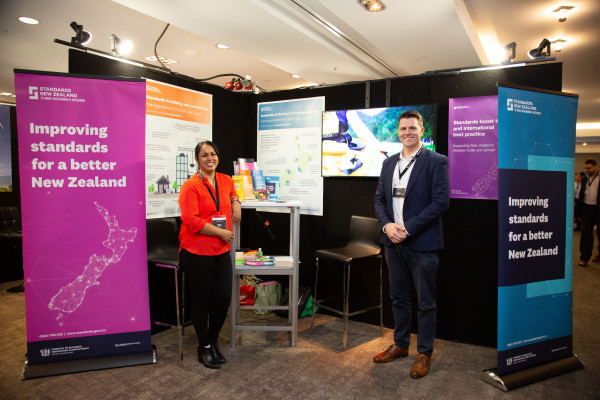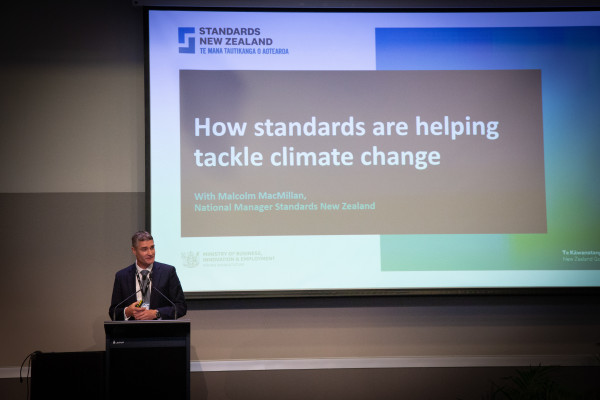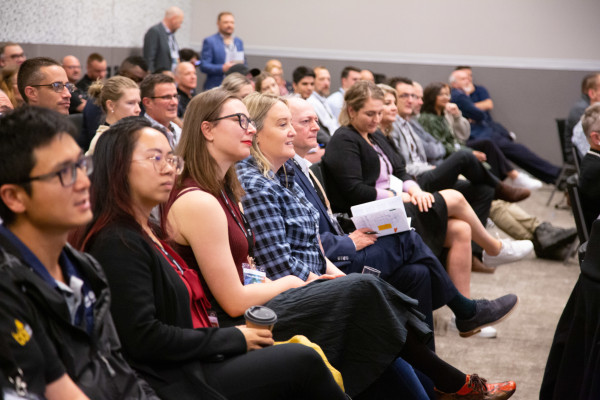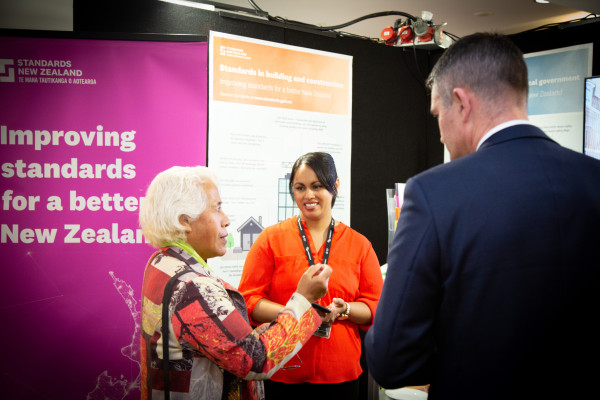Standards supporting solutions for climate change at BOINZ
The building sector remains a key audience for Standards New Zealand with practitioners across all roles using standards for compliance and good practice. Standards also support diverse systems used throughout a building’s infrastructure, lifecycle and the environment it is a part of.

Access Solutions Manager Vashna Sahay and Principal Standards Project Manager Sam Mason
We connected with hundreds of practitioners at this year’s BOINZ Conference and Expo in Auckland. BOINZ, or the Building Officials Institute of New Zealand, represents over 1,200 members engaged in building controls in both the public and private sectors. While many in the sector will be familiar with standards as tools to help meet compliance with the building code, we wanted to tell the story of how standards can do so much more. This topic is particularly pertinent considering the need to address climate change in New Zealand’s building and construction sector as much as others, it will become an ever-increasing focus as our growing built environment needs to adapt and mitigate adverse effects.

Malcolm MacMillan presents to the BOINZ delegates
Presenting climate change-related standards
‘Standards supporting solutions for climate change’ was the theme of one of our presentations delivered at the conference by National Manager, Malcolm MacMillan. He explained how standards aren’t just useful to the sector in construction specifications, but in supporting how buildings are used and other infrastructure that integrates with the building’s use, such as improving energy efficiency and supporting the adoption and roll out of renewable energies in New Zealand.
Standards relate to everything we control, create, consume, build, and dispose of, and the environment we breathe. They are linked to the world around us, just as we are. Standards, like buildings, help shape the spaces we work, play and live in.
So how do standards help support solutions for climate change?
- the ISO 14000 series of international ISO standards can support measuring greenhouse gas emissions, adaptation, financing climate change activities, monitoring, and communication on environmental performance.
- the sustainable development goals associated with each ISO standard can help understand how standards support intergovernmental initiatives.
- the range of publicly available specifications (PAS) developed with EECA can help reduce energy use and increase energy efficiency.
- the EV PAS developed to support charging efficiency across the 70,000 (and growing) EV market can encourage smart charging to manage peak demand.
- minimum energy performance standards used in appliances within kitchen and laundry fit-outs and televisions ensure inefficient energy-guzzling appliances can’t enter the market.
- the new PAS for smart home energy management systems can turn a home into a smart home that can automatically reduce pressure on the grid.
- future-focused work on the standards framework and roadmap of standards adoption and modification required to integrate hydrogen across NZ’s energy landscape. The advice on the subsequent hydrogen report can pave the way for change.
And of course, there was mention of sector-specific standards revisions that include considerations for climate change-related effects including:
- NZS 4431 Engineered fill construction for lightweight structures considering increased slips,
- NZS 20086:2022 Light and lighting to improve the energy performance of lighting in buildings and ISO 52000 Energy performance of buildings series for integrated whole-of-building energy and emissions performance evaluation and
- NZS/AS 1720:2022 to encourage good practice in using timber confidently and creatively.

Delegates at the BOINZ Conference 2023
One of the most important aspects of attending conferences is the time spent connecting with delegates working in the sectors. Principal Standards Development Project Manager Sam Mason and Access Solutions Manager Vashna Sahay spoke with delegates about opportunities to get involved on standards development committees. This was further supported by a presentation by Sam for anyone considering getting involved.
Both the ‘use of standards for climate change solutions’ and ‘participation’ are topics that apply to all sectors, not just building and construction. We would be happy to talk to anyone keen to get involved or implement standards in your line of work toward a better environment for all New Zealanders.

Vashna and Malcolm talk with a delegate
